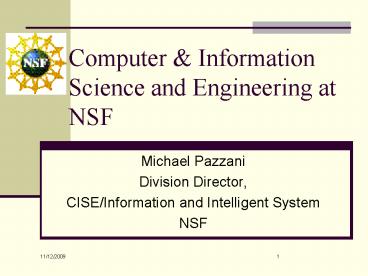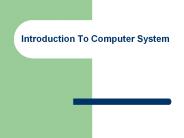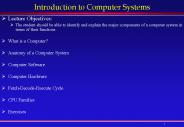Computer - PowerPoint PPT Presentation
1 / 22
Title:
Computer
Description:
NSF and CISE Organization and Programs. NSF Initiatives: The other half ... Learning More about NSF: Follow the money http://dellweb.bfa.nsf.gov/ 8/21/09. 18 ... – PowerPoint PPT presentation
Number of Views:30
Avg rating:3.0/5.0
Title: Computer
1
Computer Information Science and Engineering at
NSF
- Michael Pazzani
- Division Director,
- CISE/Information and Intelligent System
- NSF
2
Overview
- NSF and CISE Organization and Programs
- NSF Initiatives The other half of the budget
- NSF and Homeland Security
- Learning more about NSF/CISE
- My proposal wasnt funded, now what?
- My proposal was funded, now what?
- Personal Advice Not Official NSF policy
- How you can help NSF
3
NSF Mission
- To promote the progress of science
- to advance the national health, prosperity, and
welfare - and to secure the national defense.
4
NSF Organization
5
CISE Directorate 2004
- Computing Communications Foundations
(CCF)Kamal Abdali - Computer Networks Systems (CNS)Greg Andrews
- Information and Intelligent Systems (IIS)
Michael Pazzani - Shared CyberInfrastructure (SCI) Mari Maedi,
Acting Division Director
6
Information and Intelligent Systems2004 135M
in 2003 (100M in 2002)
- Information and Data Management
- Artificial Intelligence and Cognitive Science
- Digital Society and Technologies
- Human Computer Interaction
- Universal Access
- Human Language and Communication
- Robotics and Computer Vision
- Special Projects (Digital Libraries)
- Science and Engineering Informatics
- Bioinformatics
- Geoinformatics, Earth Science Informatics,
Materials, . - Digital Government
- Computational Neuroscience
7
Types of proposals/awards
- IIS Regular Proposal Deadlines 250-600K 3 yr?
- Mid December Deadline
- REU RET supplements?(10-30K 1 year)
- Mid March Target Date.
- CAREER Program ? (400-500K, 5 year) late July
- Information Technology Research (ITR)
- Look for changes in 2004
- Mid January-gtFeb Deadline
- One sized proposal
- Focused (Information Integration,
Cybersecurity, Science of Design)
8
NSF Initiatives and Cross-disciplinary programs
- Information Technology Research (ITR)
- Integrative Graduate Education and Research
Traineeship (IGERT) - Sensors
- CAREER
- CyberSecurity/ CyberTrust
- Human and Social Dynamics
- Science of Learning Centers
- Cyberinfrastructure Coming Soon
9
IGERT Integrative Graduate Education and
Research Traineeship (IGERT) Program
- A comprehensive interdisciplinary theme,
appropriate for doctoral-level research, that
serves as the foundation for traineeship
activities - Integration of the interdisciplinary research
with innovative graduate education and training
mechanisms, curricula enhancement, and other
educational features that foster strong
interactions among participating students and
faculty - Integrated instruction in ethics and the
responsible conduct of research - Institutional strategy and operational plan for
recruitment, mentoring, and retention of U.S.
graduate students, including efforts aimed at
members of groups underrepresented in science and
engineering - 30K graduate fellowships
- Information Management is a important component
of nearly every science. This community should
get more involved.
10
Science of Learning Centers
- 3 to 5 Center awards and 20 Catalyst awards a
year - The neural basis of learning in humans and other
species - Machine learning, learning algorithms, knowledge
representation, robotics, adaptive systems, and
computational simulation of cognitive systems - Visualization and representation of complex
phenomena and multidimensional data - Analogical reasoning, mathematical reasoning,
causal analysis, general and domain-specific
aspects of mathematical and scientific
problem-solving, creativity, and intelligence - Learning of disciplinary content including
assessment, structure of disciplinary knowledge,
pedagogical content knowledge, learning in formal
and informal educational settings, and equitable
access to learning - Learning technologies, including intelligent
tutoring systems, visualization tools,
computer-supported collaborative environments,
digital libraries, and real-time assessment
tools
11
Coming Soon- Cyberinfrastructure Information
Infrastructure enables scientific discovery
12
Cyberinfrastructure
- provide an integrated high end system of
hardware, software, and services that ... - enables scientists and engineers to work on
advanced research and education problems that
would not otherwise be solvable
13
National Security Homeland Security
- NSF Mission To promote the progress of science
to advance the national health, prosperity, and
welfare and to secure the national defense. - When initiated or supported pursuant to requests
made by any other Federal department or agency,
activities shall be financed from funds
transferred to the Foundation - Why NSF?
- Peer-review system identifies highly meritorious
projects. - Established relationship with top researchers on
a broad range of topics identifies match between
agency needs and researchers capabilities. - Types of Support
- Foundational research in areas such cryptography,
network security, machine translation, speech
analysis, robotics, information fusion, image
analysis, data mining, collaborative systems,
social network analysis, bioinformatics, critical
infrastructure protection, political science with
application to a broad range of problems
including National Security Homeland Security. - Supplements funded by other agencies to existing
NSF investigators to perform unclassified
research with short-term application of interest
to the agency.
14
FY03 National Security Supplemental funding at
the National Science Foundation
- CIA/NSA/ITIC (20M)
- Knowledge Discovery Dissemination
- Management of Knowledge Intensive Dynamic Systems
- Machine Translation
- Speech Analysis
- Information Extraction
- Disease Informatics
- Detection Of Deception
- Social Network Analysis
- Research on why individuals join by terrorist
groups - DARPA (1M) Augmented Cognition
- DHS Information Integration, Biometrics
- NIMA (lt1M) Image and Motion Analysis
15
Criterion 1 Intellectual Merit
- How important is the proposed activity to
advancing knowledge and understanding within its
own field or across different fields? - How well qualified is the proposer (individual or
team) to conduct the project? - To what extent does the proposed activity suggest
and explore creative and original concepts? - How well conceived and organized is the proposed
activity? (Management plan) - Is there sufficient access to resources?
- Advice on multidisciplinary research
- If its worth doing, its worth doing well
- Involve experts from each area
16
Criterion 2 Broader Impacts
- How well does the activity advance discovery and
understanding while promoting teaching, training,
and learning? - How well does the activity broaden the
participation of underrepresented groups ? - To what extent will it enhance the infrastructure
for research and education? - Will the results be disseminated broadly to
enhance scientific and technological
understanding? - What may be the benefits of the proposed activity
to society?
17
Learning More about NSF Follow the money
http//dellweb.bfa.nsf.gov/
18
Learning More about NSF
- Visit the CISE web site Oct 1.
- www.cise.nsf.gov
- Subscribe to the CISE newsletter
- To subscribe send a message to
join-cise-announce_at_lists.nsf.gov with no text in
the subject or message body
19
My proposal was funded, now what
- Congratulations, its a competitive world.
- Do innovative and foundational research and
report it (acknowledge NSF) - Conferences and Journals in your field
- Conferences and journals outside your immediate
field for multi-disciplinary research - General CS/Science outlets CACM, Science
- Put it on the web Summaries and Papers (if
permitted) - Home page
- Computing Research Repository (CoRR)
- Popular Press (tech related, Wired) or General
(Local news or national). NSF can help with a
press release. - Tell Program Director and DD about it Send PPT.
- Solve the whole problem, not just the easy part
- Why would someone want to use this?
- Usability, Security, Privacy, Efficiency,
Reliability, Formal Limitations and Assumptions
20
My proposal wasnt accepted. Should I resubmit?
YES, but
- Rated Highly Competitive but not funded ?
Update proposal (6 months to a year have passed),
address concerns and resubmit. - The reviewers didnt get it
- Was the proposal clear? Especially abstract
how it is a significant advantage over state of
art broadly defined. - Was it sent to the right program? We almost
always fix within IIS, sometimes with CISE and
rarely across NSF. - Too preliminary Do some initial work and
resubmit. - Constructive Criticism in reviews. Fix, update,
make sure its clear - Multidisciplinary but the other discipline didnt
like it. Are you dabbling or doing
multidisciplinary work? If the other discipline
is more of an inspiration than an application,
keep it out of the title and abstract or mention
several in the abstract - Didnt address broader impacts ? Mention outreach
programs at university and/or help dept, school
create some. Will your software and DATA be
available to others, etc - Multi-investigator Integrate research topics
rather than append them. Be critical of each
other.
21
How you can help NSF
- Submit High Quality Proposals
- Innovative, but achievable
- Well-written Address broader impacts
- Participate in Reviewing/Panels
- Keep an open mind to alternative approaches
- Give Constructive Reviews
- Host a panel or two on the left coast (or
airport hub in midwest) - Keep Program Manager informed of findings
- Nuggets
- CISE Newsletter
- Joint Press Releases
- PowerPoint of Conference Presentations
- Participate in NSF Workshops
- Rotate in as a Program Manager (IPA) or Division
Director - Data management for shared cyberinfrastructure
- Data and Application Security
22
(No Transcript)































